- Find a Provider
-
Services
-
Redeemer Health provides compassionate care across every stage of life.
- View all Services
- Health Care
- Cancer Care
- Heart Care
- Hospital at Home
- Maternity Care
- Pediatric Urgent Care
- More Health Care Services
-
- Patients & Visitors
- Locations
- Careers
categories:
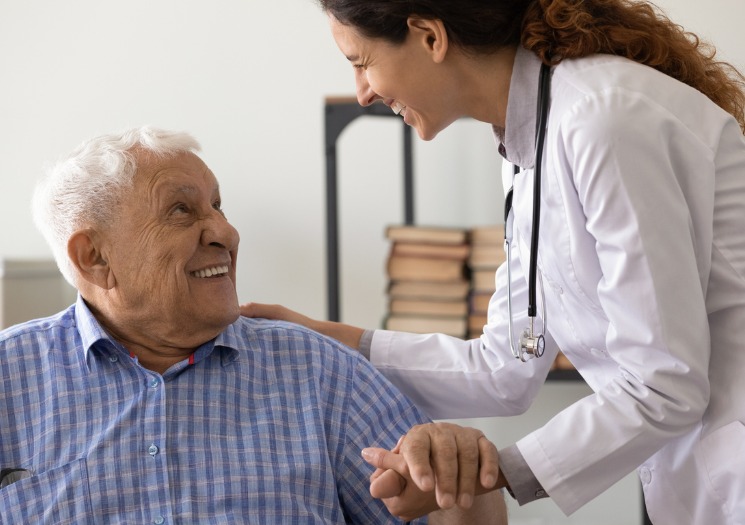
The earliest generation of Redeemer Health caregivers were our founding Sisters, who came to America to care, comfort, and heal the sick and poor in their homes. We are still answering that calling today, with nurses, therapists and home health aides following the compassionate example set by the Sisters nearly 100 years ago.
Our skilled professionals bring comfort, compassion, safety, and trust to each family we serve—all in the comforts of your own home. With our services, you will find nurses, therapists, and home health aides who provide skilled nursing, disease and pain management, wound care, and rehabilitative services. The key is knowing what type of home care to ask your doctor about. Here’s a quick tutorial:
- Home Care - Ongoing skilled care for chronic conditions that are manageable but improvement or recovery may be limited.
- Advanced Care at Home - Skilled and specialized care with a focus on quality of life and symptom management for patients who have advanced-stage illnesses that are not expected to improve.
- Support at Home - Assistance with daily living tasks, such as medication management, transportation, meal preparation, and companionship.
- Hospice Care - Once curative treatment has stopped for patients with a life-limiting illness, the focus shifts to comfort care and symptom management, support for patient and family, and quality at the end of life.
- Palliative Care - This provides you and your loved ones with extra support to lessen the burden of chronic or terminal illnesses. You can learn more about the difference between palliative and hospice care here.
Wherever you choose to get your home care services, be sure they focus on your overall health, medical history, abilities, lifestyle, goals, and other factors—all the things that make each patient unique. Now that you’re better informed, do you believe home care or hospice care can help you or a loved one? We’re happy to answer your questions. Please call 888-678-8678 or read more here.
categories:

Did you know that colorectal cancer is the third most commonly diagnosed type of cancer in both men and women over 45? Knowing the facts about early diagnosis and treatment, as well having conversations with your family or primary care doctor about screenings, are two important steps you can take to help reduce risk.
Tips to lower your risk
Living a healthy lifestyle can help decrease your chances of developing colorectal cancer. This includes taking steps like:
- Maintaining a healthy weight
- Avoiding smoking
- Limiting alcohol consumption
- Engaging in regular physical activity
- Maintaining a balanced diet that includes lots of fresh fruits, vegetables and whole grains, while limiting processed meats
Additionally, if you have family members diagnosed with colorectal cancer or certain inflammatory bowel diseases like ulcerative colitis or Crohn's disease (especially over age 45), be aware that this could put you at greater risk - so take extra care!
Know the signs and symptoms
Some common signs and symptoms of colorectal cancer include:
- Feeling tired
- Having a change in weight
- Bloating/gas/constipation/diarrhea lasting more than 4 weeks
- Blood in your stool (which may look like black tarry stools)
- Rectal bleeding
If you have any of these symptoms that last more than 4 weeks, it is important to consult your family doctor or primary care physician.
Screenings play an important role in the detection of colorectal cancer
Talk with your doctor about which is the best colorectal cancer screening for you. Tests that are used to examine the inside of the large intestine (colon) and rectum, tests that can detect hidden blood in the stool, or screenings that can identify genetic changes in the cells of the colon could all be possibilities, depending on your age and other individual risk factors.
Take control of your colorectal health
Your family doctor or primary care physician can help you understand your risk factors and what you can do to protect yourself from colorectal cancer. They can also provide guidance on when you should get screened. Don't wait until something is wrong to see your doctor – make sure you stay on top of your colorectal health and get the peace of mind that comes with knowing you're doing everything you can to protect yourself.
To find a Redeemer Health family doctor or primary care physician, call 800-818-4747 or visit the Redeemer Health website.
categories:
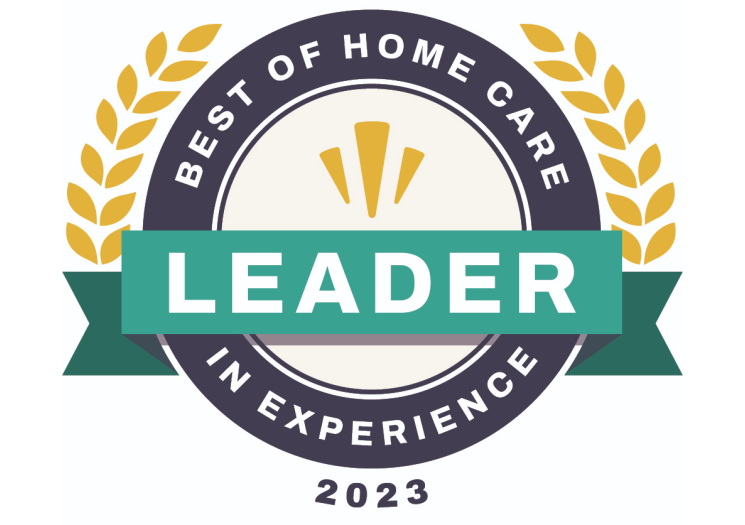
Redeemer Health Support at Home received the distinguished 2023 Best of Home Care - Leader in Experience Award from HCP, the leading firm in experience management for home care. The Leader in Experience Award is the highest recognition awarded by HCP and is given to select home care businesses that consistently rank among the very highest in 10 or more quality metrics.
As a Leader in Experience, Redeemer Health Support at Home is now recognized among the 10% of home care providers participating in the nationwide HCP Experience Management Program. Both clients and caregivers were interviewed by HCP and they consistently offered high satisfaction ratings in areas such as caregiver training, compassion of caregivers, communication, scheduling, client/caregiver compatibility, and more.
Visit here to learn more about Redeemer Health Support at Home.
categories:

The extraordinary care delivered in the Senior Behavioral Health Unit (SBHU) at Holy Redeemer Hospital resulted in a donation from a grateful family. Their philanthropy, in turn, has brought music to patients' ears. The family of a former patient made it possible to stream music in all SBHU inpatient rooms. Now it's as easy as saying "play Frank Sinatra" and Fly Me to the Moon will fill a patient's room with magical melodies and memories.
Go no further than a quick Google search to find reams of research that support music's therapeutic benefits:
- It reduces anxiety and the physical effects of stress.
- It improves healing.
- It helps manage disease.
- It eases depression and other symptoms in the elderly.
- It helps improve self-expression and communication.
Music's profound effects on us are physical, psychological, cognitive and social. And now it's available in the SBHU space with a simple voice prompt. The goal of the installation was to enhance a patient's ability to be in an environment of their own choice, creating their own experiences and evoking meaningful memories. Said the grateful family about their donation: "(We) wish the music to bring a bit of peace in your soul and to comfort you."
Each patient room has been outfitted with ADA-compliant controls for music selection and volume, as well as integration with patient hearing aids. The common rooms in the unit also now have 60-inch televisions with Bluetooth headphones for patients.
categories:
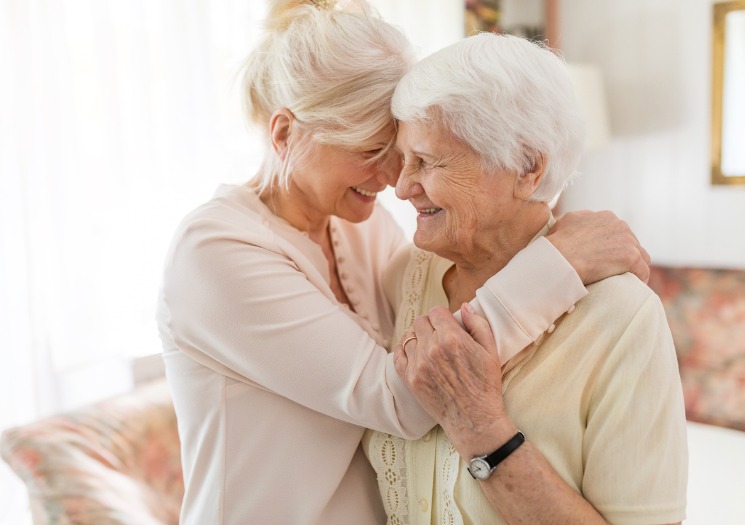
It's often a privilege to care for someone you love. Unfortunately, the challenges of being a primary caregiver can be emotionally taxing. You may feel uncomfortable asking for help. Or you may have to deal with complicated family dynamics surrounding caregiving decisions. Not to mention financial challenges that may accompany the responsibilities of caregiving.
Well, you're not alone. According to the National Alliance for Caregiving, about 44 million people in the United States are unpaid caregivers. So, in recognition of National Caregivers Day, on Feb. 17, we're sharing our best tips on coping with the emotional challenges of being a caregiver.
We want you to remain healthy throughout your caregiving journey, and the following nine tips will help you do just that!
Get Regular Exercise
It's no great secret that regular exercise has tremendous benefits. As a caregiver, being physically active will help you manage your weight, reduce disease risk, and strengthen your muscles and bones while improving cognitive function. The key to an effective exercise routine is finding an activity you enjoy and that fits your schedule.
Spend Time in Nature
One way to stay physically active is by spending time in nature. Weather and time permitting, you can try walking in the park, hiking, or biking. Studies from the National Institutes of Health (NIH) show that spending time in nature helps lower heart disease risk, combat depression, and improve sleep.
Eat a Healthy Diet
Like regular exercise, nutritious food strengthens the body and mind. Eat balanced meals, which include plenty of fruits and veggies, and swap fatty foods with leaner options.
Hydrating is also important. Staying hydrated will help relieve fatigue, control hunger, and maintain cognitive function.
Get Your Sleep
In addition to a nutritious diet and regular exercise, prioritizing sleep will help you function better during the day. But as a caregiver, this may be easier said than done. After all, about 50 to 70 million people living in the U.S. have trouble getting enough sleep, per the NIH.
If sleep is hard to come by, try adopting relaxation techniques in addition to a healthy diet and workout routine. Additionally, you can consult with your doctor on ways to help improve your sleep.
Devote Time Each Day to Relaxation
As a caregiver, carving out time for relaxation is an absolute must.
Do you have a go-to hobby? If not, consider reading, gardening, painting, cooking, learning to play an instrument, doing yoga, hiking, or biking. These are just a few relaxing activities that can greatly reduce stress.
Seek Community with Others
Being a caregiver can sometimes result in unwittingly neglecting the companionship of others.
"Maintaining relationships with others creates a support system that lifts you up," says Tina O'Neill, Personal Care Social Worker at Lafayette, a Redeemer Health senior living community.
Avoid the company of energy vampires or negative people who can emotionally drain you. Joining a caregiving support group can be a great gift as you can share fellowship with others who experience the challenges of being a caregiver.
"Knowing that you're not alone in how you're feeling is just such a relief to most people," says Tina. "If you're really feeling at the end of your rope, meeting people in the same situation through a support group, whether formal or informal, is really important."
You can find support groups by contacting the Alzheimer's Association. Senior community centers and local houses of worship are also good ways to connect with sources that provide support groups for caregivers.
Keep a Journal
Penning a journal can be especially beneficial. You can actively work through challenging emotions while acknowledging and celebrating the golden moments.
"Journaling is also really good because it gives you a chance to put on paper what you might be afraid to say to or about somebody," says Tina.
Plan for the Future
O'Neil suggests planning for the future as far in advance as possible by setting up a living will and having a power of attorney in place. Being properly prepared will ease stress for caregivers, especially in an emergency.
Don't Be So Hard on Yourself
Like many caregivers, you may feel you must do everything yourself – and perfectly. This perfectionist mindset may lead to guilt or frustration when an inevitable mishap occurs. So the best thing you can do is forgive yourself. After all, you're human, and nobody's perfect. Most importantly, you're doing the best you can.
Also, remember that it's always ok to ask for help. Having a healthy support system, be it a support group, friends, or family, can do wonders to alleviate the stress of caregiving.
Help for When You Need a Little More Endurance
Redeemer Health welcomes caregivers to learn about the many services we offer that help soothe the challenges of caregiving.
From short-term recovery to comfort during advanced illness, Redeemer Health Home Care provides compassionate care for patients and their families throughout southeastern Pennsylvania and New Jersey. Moreover, our Support at Home services just received the distinguished 2023 Best of Home Care - Leader in Experience Award from HCP, the leading firm in experience management for home care.
Redeemer Health also offers comforting accommodations for personal care (similar to assisted living), memory care and long-term care in our Lafayette or St. Joseph Manor senior living communities.
And, if caregivers should need to be out of town for a few nights, or are planning a well-deserved vacation, the respite care program at our senior living communities provides short-stay lodging and care to those who need assistance with everyday tasks. More information about respite care is available by calling 215-214-2877.
To every caregiver—thank you for all you do. On National Caregivers Day—and every day—we honor and acknowledge the loving and selfless care you provide.
topics in this article
categories:
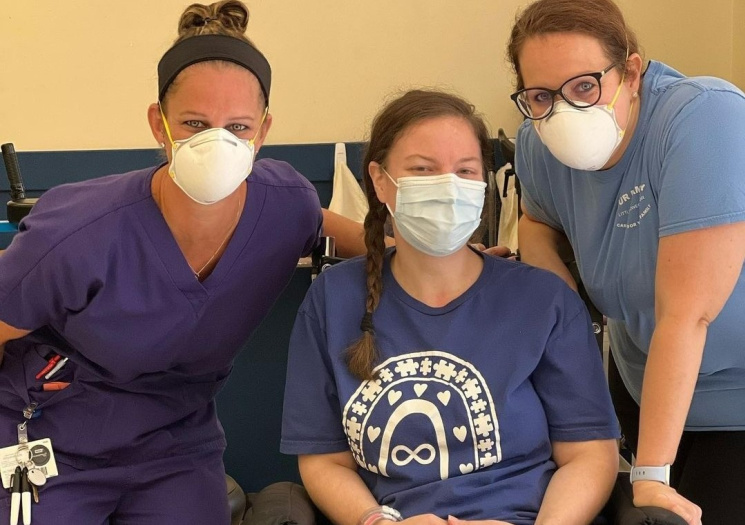
Ask Brandi Michalenicz how she’s doing, and she’ll say, "Livin' the dream."
Her response speaks to the strength and resilience of her spirit. Just a few short months ago, the 33-year-old couldn’t lift her head or move her arms and legs—and it wasn’t clear she ever would again.
She found help from an unexpected source: Little Flower Manor, a skilled nursing facility in Darby, part of Redeemer Health.
A special education teacher at MaST Community Charter School in Northeast Philadelphia, she took students on a field trip to the Philadelphia Zoo on the Thursday before Memorial Day. On Friday, Michalenicz was at home cleaning and doing errands. She sent her one-year-old daughter, Arwen, off to daycare, and by noon, she had cleaned her home and done the grocery shopping. That’s when she noticed it.
“All of a sudden, my legs started feeling very heavy,” she says. “I just thought it was muscle fatigue from walking around the zoo all day.”
Saturday came. Her legs were heavier. So were her arms. She knew this was more than tired muscles. “I teach, so I’m active all day,” she says. “A field trip really should not have exhausted me that much.” By Sunday she couldn’t carry her daughter upstairs for a diaper change.
A Monday visit to urgent care showed only a slightly elevated white blood cell count.
On Tuesday, she didn’t feel safe making the long drive to work from her home in Clifton Heights, Delaware County. It wasn’t getting better. It was actually getting worse. She and her husband made a trip to the ER, and the hospital kept her overnight for observation. Michalenicz was at a loss. “I’m very healthy. I’ve never even had the flu. I don’t get sick.”
The next day, she underwent a nerve conduction study, which measures how fast an electrical impulse moves through your nerve. The doctor said without hesitation, “You have Guillain-Barre.” Michalenicz’s first question: “What’s Guillain-Barre?” She learned that the myelin sheath around her nerves was coming undone. Guillain-Barre (gee-YAHN-buh-RAY) syndrome is a rare disorder where the immune system attacks the nerves.
That night, Michalenicz was started on intravenous immunotherapy. She would have five nights of treatment at a hospital. “When I woke up Saturday morning, I could not get out of bed,” Michalenicz says. “It was horrifying.” She finished treatment, but her condition continued to worsen. “My arms got to a point where I couldn’t move them,” she says. “I couldn’t lift my neck.”
On the last day of the second round of infusions, Michalenicz woke to find she could shake her foot. “After a month of not being able to move, shaking my foot was astronomical,” she says. “I very slowly started getting better.” Still, she couldn’t go home. The answer: a skilled nursing facility.
When the hospital social worker gave her a list of facilities, she saw that Little Flower Manor is in Darby, only seven minutes from her home. Her husband could easily visit and bring Arwen. And it was among the highest rated on her list. Her decision was made.
In the midst of her ordeal, Michalenicz received additional news: She was pregnant.
Little Flower Manor’s chief administrative officer Rosemary Port, RN, remembers when Michalenicz arrived. “She couldn’t take herself to the bathroom, she couldn’t hold the utensils, everything was so heavy for her,” says Port. “She was so weak, and she was also pregnant. We had two lives we were concerned about.”
Michalenicz wasn’t a typical patient for Little Flower Manor. “You don’t expect somebody so young in a nursing facility,” Port says. “Our average age is 82.” Nonetheless, she says, “We broadened our scope for her, and I’m glad that we did. We had to help.”
Port adds, “Our mission is to take care of people. And Brandi’s from our neighborhood. That’s what community is all about.” While she had concerns about Michalenicz’s condition, she also had confidence in her team. “I had no doubt that, if given the chance, they could get her back with her family,” she says.
She credits the talent of her therapy team. When Michalenicz arrived, they got right to work. The first step was trying to get sensation back in her legs, Port says. They used a machine called a TRAM (transfer and mobility device) that lifts and supports patients while simulating walking. “We couldn’t go very far at first, but she felt elated that she was actually on her feet again,” Port recalls. “She was dressed in her regular clothes and she had sneakers on, and to her that was huge progress. I think just seeing that there was potential gave her hope.”
Once Michalenicz started to progress, there was no turning back. “Every week, she got stronger and stronger,” Port says. “It was amazing. Once she hit her stride and we saw her walk about 50 feet, everything started coming back. Nobody was more determined than Brandi,” she says. “She had a quiet strength about her.”
“They were amazing,” Michalenicz says. “They were so encouraging. When you have somebody else cheering for you, it’s so much easier.”
When she left Little Flower at the end of a month, Michalenicz could walk 150 feet with the help of a walker, dress herself, and get into a car. “She looked great,” Port says. “She was doing wonderfully when she left.”
Michalenicz has continued to progress at home. “I have to plan out how many times I’m going to do the steps in a day. I have difficulty crouching down. I’m not going to be doing any squats anytime soon,” she says. But those minor limitations are eclipsed by enormous milestones like returning to work. “I’m cleaning the whole house,” she says. “I’m going grocery shopping. I’m driving—which was a big thing. I’m lifting Arwen. I remember when I couldn’t lift a piece of paper, and now I’m lifting my 25-pound child.”
She credits faith and prayer with getting her through. She also credits her own fortitude, along with the encouragement and talent she found at Little Flower Manor.
“We got her home,” says Port. “And I can’t tell you what a morale booster it was for us to be able to do that. She just had this quiet courage and strength about her, and we all appreciated that,” Port says. “They looked to her as a role model.” She is somebody we will remember for quite some time. She gave us a lot, maybe even a little bit more than we gave her.”
Call 610-534-6000 or visit here to learn more about Little Flower Manor.
categories:
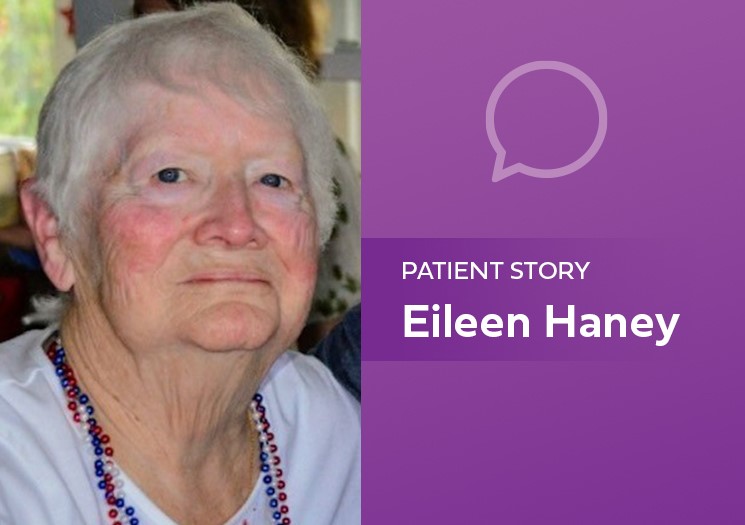
Eileen Haney swore she’d never have back surgery. Now she says it’s the best thing she’s ever done.
Trouble started for the 80-year-old North Philadelphian last fall. “Out of the blue, my leg started to bother me,” says Haney. “An awful pain was going down my right leg. I couldn’t drive. I could barely walk.”
She consulted a Redeemer Health orthopedic physician who administered several epidural injections, but they didn’t help much. The orthopedist referred her to James McKenzie, MD, an orthopedic spine surgeon at Redeemer Health’s Comprehensive Spine Center, a partnership with Global Neurosciences Institute. The center emphasizes a collaborative, interdisciplinary approach and offers the combined expertise of orthopedic surgeons, neurosurgeons, and rehabilitation experts.
Collaborative nature
By the time she saw Dr. McKenzie, Haney was suffering severely. “It was really taking a toll on me,” she says, “and I didn’t have any quality of life.”
Dr. McKenzie found that Haney had lumbar degenerative disc disease—a condition in which age-related wear and tear on spinal discs causes pain. He worked with her to manage the condition. “Surgery was going to be a last resort,” he says. But Haney continued to deteriorate.
“Over time, Eileen was having so much difficulty walking and tolerating pain, even when she was just standing,” Dr. McKenzie recalls. “It was impacting her ability to do any activities. We reached a point when we decided to consider surgery.”
Haney was fond of the surgeon. “Dr. McKenzie was so nice and professional and honest,” she says. “He made me feel very comfortable.” Nonetheless, she had doubts about undergoing an operation.
“I was really leery of having this surgery,” she says. “I thought I was too old. Dr. McKenzie assured me that I wasn’t too old, and that my legs were still strong, and I wouldn’t have a problem. And I didn’t.”
Dr. McKenzie decided to draw on the collaborative nature of the spine center. He asked center colleague, Atom Sarkar, MD, a neurosurgeon at Global Neurosciences Institute, to pitch in. “Having Dr. Sarkar there would reduce the operation time,” he explains.
“It was great,” Haney recalls. “I had immediate relief. The next day I was up, walking around. I had a new lease on life.” Home visits from a physical therapist and visiting nurse aided her recovery.
“Now I’m back to doing everything,” she says. “I can walk. I can drive again. I’m more independent.”
Dr. McKenzie was pleased with his patient’s recovery. “She bounced back quickly,” he says. “We were blessed to see such a good outcome for her.”
He remembers a particularly poignant moment: “At her six-week follow-up, her husband said, ‘Thanks for getting my wife back.’ And that’s why we do the things we do. We help people restore their function and get back to the lives they want.”
Best thing I ever did
Dr. McKenzie believes the interdisciplinary spine center represents the future of spine surgery. And he expects the center to expand. “Our plan is to grow,” he says, “and to provide tertiary-level care in a community setting, instead of having to go downtown.”
The center focuses on what’s best for each individual, which may or may not be surgery, he says. “Our goal is to have surgery be a last resort,” he explains. Center surgeons work with patients to ensure they get therapy or alternative treatments they need first.
Dr. McKenzie also values the relationships he builds with each patient. “Treat people the way you want to be treated. Treat patients like you treat family,” he says.
Haney is very happy with her experience at the center. “I got such good care,” she says. “Everyone was so nice and concerned about me.”
As for the surgery, she says, “It’s the best thing I ever did. I swore I would never have back surgery, but then I realized I wasn’t living.” She is living now, including regular trips to her condo at the beach. “I’m back to the shore pretty much every weekend now,” she says.
A partnership between Redeemer Health and Global Neurosciences Institute, the Comprehensive Spine Center is an innovative program where the combined expertise of neurosurgeons, orthopedic surgeons and rehabilitation specialists work together to provide dedicated support and navigation throughout your care. Call 215-910-4463 or visit www.compspinecenter.com for further information.
topics in this article
categories:

For Natasha Fonseka, the calling to become a cardiologist was one she happily answered.
“I have a strong passion for preventive health," she says. "My mom has rheumatic heart disease. My dad had a heart stent put in at an early age. I've seen what diseases can do to a community, to a family, and to a person. So anytime I can prevent that suffering, it's a win for me."
Dr. Fonseka's passion for preventive medicine, especially regarding heart disease,
is what attracted her to Redeemer Health and the community it serves.
Heart disease is the number one cause of death in the United States. Every 34 seconds, someone passes away due to complications of heart disease.
Why is Heart Disease So Prevalent?
A major contributing factor is our diet. Sodium in foods and salt can have a significant effect on our blood pressure. "We're, on average, eating two or three times the recommended amount of salt," says Dr. Fonseka.
Federal dietary guidelines suggest no more than 2,000 mg of sodium daily, which is about one teaspoon of salt. "Depending on health issues such as uncontrolled high blood pressure or congestive heart failure, the restriction may be less than 1,500 milligrams a day," says Dr. Fonseka.
Over time, high sodium intake can contribute to hypertension, which damages the arteries, making them less able to carry blood and oxygen to the heart, she explains.
Finding the Sodium Solution
Monitoring your sodium intake is one of the best things you can do for your heart health. And it's easier than you think once you know how.
According to Dr. Fonseka, processed food is the primary source of sodium for most people. You can reduce your sodium intake by getting into the habit of reading food labels when grocery shopping. Food labels provide a wealth of information regarding ingredients and serving sizes.
For example, a bag of potato chips may have only 300 mg of sodium per serving. But say you eat the entire bag, which contains three servings. Before you know it, you've consumed 900 mg, or 45 percent, of your daily sodium allowance.
Learning to read food labels, moving away from processed foods such as hot dogs, bacon, salami, fast foods, and sweetened drinks, and consuming more water and natural fruit and vegetables can help improve heart health, she advises.
The Mediterranean Diet
A Mediterranean diet can help you combat heart disease—a fact supported by the New England Journal of Medicine. Their study showed that those who adopted the diet had significantly lower rates of strokes, heart attacks, and other related conditions.
The focus is on consuming the right amounts of olive oil, fruit, nuts, and vegetables, a moderate intake of fish and poultry, a small amount of dairy products, red meat, processed meats, sugar, and wine in moderation.
But with rising food prices, you may question whether following the Mediterranean diet will fit into your budget. After all, these items can be a bit pricey, and processed foods are so much cheaper.
As Dr. Fonseka puts it, "You are actually saving money by not having to go to a doctor, not having to go to a pharmacy to pick up medication, not being admitted to a hospital, and being able to go to work to provide for your family."
You can get the health benefits of the Mediterranean Diet and save money by creating a meal plan. Creating a meal plan may seem cumbersome, but once you've planned a week of meals, you'll discover it's a great time and money saver.
Get Pumped
While lowering sodium intake and adopting healthy eating habits are essential, Dr. Fonseka also stresses the need for regular physical activity.
According to the National Library of Medicine, you need to do at least 30 minutes of moderate exercise five times weekly to effectively lower your risk of developing heart disease. If you’re new to exercising, try brisk walks, jogging, or swimming. Strength training also helps to lower body fat and encourage lean muscle growth.
The key is to start slowly, she says. Begin with 10- to 15-minute workout sessions a day and strength train using one- to three-pound weights. Regular aerobic activity and strength training can help strengthen the heart and reduce extra body fat, especially belly fat, which is linked to an increased risk of heart disease.
And don’t forget about your mental health.
According to Dr. Fonseka, "We're not putting enough emphasis on our mental health, which impacts all organs, including the heart."
Want to win the fight against heart disease? Lower your sodium intake, exercise regularly, eat a heart-healthy diet, and pay attention to your emotional well-being.
About Dr. Fonseka
Dr. Fonseka is an expert in cardiovascular health, diagnosing and treating conditions related to the heart. She has a keen eye for detail, from chest pain to leg swelling, and lightheadedness or fatigue.
She not only specializes in hypertension and hyperlipidemia, but also takes a holistic approach, providing valuable insight into coronary artery disease, congestive heart failure, nutrition and women's health.
Dr. Natasha Fonseka sees patients at Redeemer Health Cardiology - Feasterville, located at 23 Bustleton Pike, Feasterville, PA 19052. Her office can be reached at 215-436-1420.
categories:
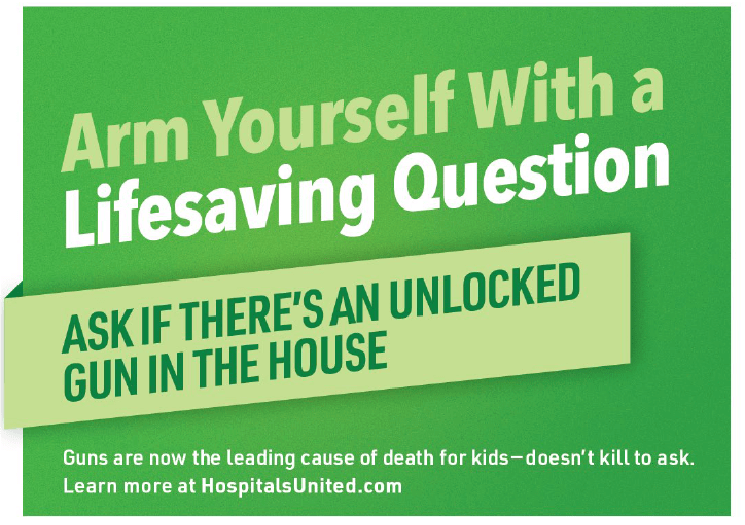
In an effort to encourage families and communities to take an active role in protecting children from gun violence, leading health care systems across Pennsylvania, Delaware and New Jersey have joined thousands of hospitals and health associations in a nationwide public awareness and education campaign.
Redeemer Health is one of the 13 health systems in the tri-state region to add its voice to the campaign. Given the prevalence of gun violence in the Philadelphia area, the coalition united to face this crisis together, as they’ve done to encourage masking during COVID-19 and other efforts to help protect public health in our communities.
The “It Doesn’t Kill to Ask” campaign provides caregivers, parents, and community members with actionable tools to speak up about safe gun storage and help them feel empowered to ask other parents about access to guns in a home their child might visit.
Gun violence requires a comprehensive approach to prevention and treatment through community education, outreach, and advocacy. A key part of prevention is normalizing conversations about gun storage. The campaign comes at a time when an average of 13 children die from guns every day, making guns the leading cause of death in children.
Through a series of broadcast, print and digital public service messages, along with a website, the campaign will highlight that access to unlocked guns may lead to death, suicide, and gun violence, making it more likely that children will die from guns than from cancer or automobile accidents. The website provides tips on how to have a conversation with other parents and families about safely stored firearms and encourages making this conversation as normal as asking about pets or food allergies before a playdate.
The campaign is spearheaded by Northwell Health, New York State’s largest health system.
categories:

MEADOWBROOK, Pa. – January 2023 – Holy Redeemer Hospital is among only 21 Pennsylvania hospitals recognized in the Excellence in Patient Safety program, according to the Hospital and Healthsystem Association of Pennsylvania (HAP). The hospitals are ranked as the state’s top-performers by demonstrating low rates of health care-associated infections.
HAP identifies top-performing hospitals using data from the Centers for Disease Control and Prevention’s National Healthcare Safety Network. To be recognized, hospitals must perform better than the mean standardized infection ratio in three key measures: central line-associated bloodstream infections, catheter-associated urinary tract infections, and Clostridioides difficile infections.
“Effective infection prevention measures are yet another example of our commitment to safety,” said Jeanette Teets, Redeemer Health VP and Chief Quality, Safety and Reliability Officer. “To be among so few hospitals in Pennsylvania to achieve top-performing scores is testimony to the talent and allegiance our team demonstrates every day.”
Data measured for the survey was collected in 2021, while hospitals were performing in the throes of COVID-19 pandemic stress. “HAP is proud to recognize the hospital teams and leaders who demonstrated extraordinary work to protect patient safety—even as they were strained by the COVID-19 pandemic and a historic health care workforce crisis,” HAP President and CEO Andy Carter said.
